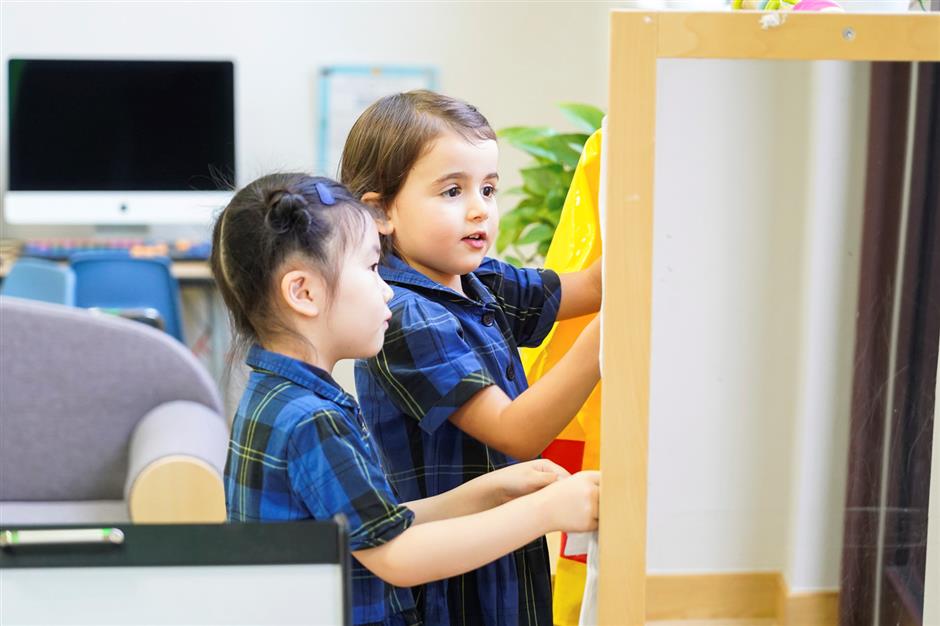It's vital to teach kids wellbeing early on

The keys to building positive relationships with children are empathy, humor and zest.
Wellbeing, throughout a child's development, and particularly in early years, is becoming a key issue in today's education field for both parents and educators.
How do they learn to set goals? How do they get up and get going? How do they cope with mistakes? How do they learn from friends?
For children, these are the essential skills that are transferable and applicable not just in school life, but throughout life.
Shanghai Daily had the opportunity to talk with Michael Orchard, head of Year 1 at Wellington College International Shanghai, who has 10 years' experience in education and had great practice in dealing with younger children.
During the Festival of Education at the school in April, Orchard shared thoughts on positive education and how it could equip pupils to flourish.
"It's about helping children build practical skills to tackle life's ups and downs," said Orchard. "They learn to celebrate those fine moments as well as get themselves out of pit."
Many influential theories have been developed on positive education by researchers such as Barbara Fredrickson (positive emotions) and Brené Brown (positive relationships).
As a passionate coordinator of Pre Prep and Lower Prep at Wellington, Orchard strives to lead pupils from Grade 1 to 3 through organized wellbeing classes. Every pupil from Year 1 to 4 must join the weekly wellbeing curriculum, including assemblies and class lessons varying from year levels.

Michael Orchard, head of Year 1 at Wellington College International Shanghai

The curriculum is based on PERMA, a model of wellbeing put forth by Martin Seligman, a pioneer in positive psychology.
Children learn how to build positive relationships, maintain positive emotions and how to navigate difficult situations in life.
For example, to teach children about empathy, a key part of the curriculum, different practical exercises are set such as drawing and writing stories.
"We could use a book which has a strong story to bring out the theme," said Orchard. "We might use puppets for the younger children and do some role play."
Through group discussion and team activities, they reflect on how they should respond in certain scenarios, say, how to help friends when they're not feeling well.
The curriculum covers essentials such as physical health and positive relationships and builds up as the children get more awareness of the skills.
"As the children go through years 1 to 4, they develop these skills in a more in-depth way," says Orchard. "They become more sophisticated in the delivery and how they will apply those things."
Orchard also stresses the partnership between school and home in nurturing a child, that essentially good learning comes from positive relationships.
"Parents are the first teachers of the children who have the most influence over them," he said. "The relationships are different, but ultimately, we both want children to be happy and lead a good life."
For a child to perform well in school, teachers need to make efforts in building a mutual connection with their students.
For instance, children tend to respond well to and are more engaged in lessons delivered by teachers who show interest and care about them.
Orchard points out that aside from being a place of security, the home should also be a place of boundaries just like school, although the limits might not be the same.
"Children need to learn how to behave as things may be very different between their home life and their expectations of school," he said. "It's the schools' role as well as the teachers' to support parents so that children can feel comfortable."
Orchard thinks the keys to building positive relationships with children are empathy, humor and zest.
"It's about having that personal connection," he said. "The children are laughing and engaging because of the way you handle the situation. They will feel secure in that environment."
Many parents and teachers may also find it hard to get their children to concentrate on a certain topic or activity.
Orchard says a good way is to focus on the positive role models and examples and let children respond. For example, you might want to address on some issues when two or three children are not paying attention.
"You might just say, look at Sally, sitting so beautifully, and instantly all of the children will look at Sally. They all want to be good, because you're focused on the positive," said Orchard.
"As a teacher, you have such responsibility and power to make a positive difference in a child's life, especially for those from less advantaged backgrounds."














